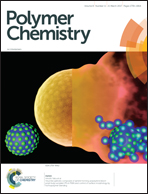Solvent-free macrocyclisation by nucleophile-mediated oxa-Michael addition polymerisation of divinyl sulfone and alcohols†
Abstract
The oxa-Michael addition reaction has been widely studied and employed in organic synthesis, but has not been developed as a tool for polymer synthesis. Herein, the 4-dimethylaminopyridine initiated polyaddition reaction of divinyl sulfone and several di- or multifunctional alcohols has been studied. This atom-economical polymerisation reaction proceeds quickly and quantitatively under solvent-free conditions producing predominantly macrocyclic products following a zwitter-ionic mechanism. Multifunctional alcohols yield duroplastic polymers. Considering the ready availability of alcohols, the oxa-Michael addition polymerisation is an interesting alternative to the well-established thiol-Michael addition polymerisation.



 Please wait while we load your content...
Please wait while we load your content...